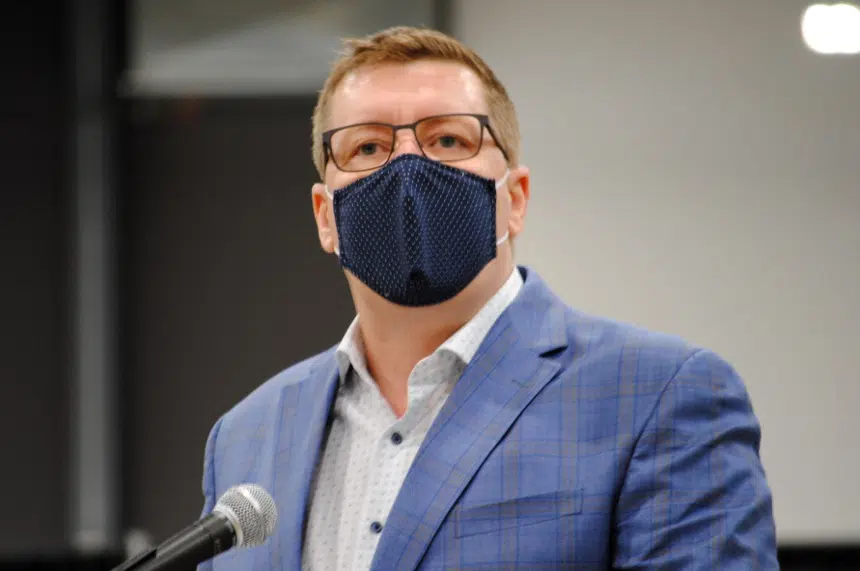The work for the government over the coming year is going to look at education, the economy, health and public safety in Saskatchewan.
Premier Scott Moe told Gormley on Thursday the Speech from the Throne to begin the second session of Saskatchewan’s 29th legislature focused on these things, as well as highlighting the difficulties Saskatchewan has navigated as a result of an especially hard fourth wave of the COVID-19 pandemic.
Moving out of the pandemic, Moe said the province will be focused on making the next generation better and brighter, with education to meet the coming demands of the economy, “flexing our provincial muscles in ensuring Saskatchewan is as autonomous as it can ultimately be.”
Within those points, Moe said the theme of reconciliation is present.
“I think that conversation has room in all of the discussions of the provincial government as we move through our work over the course of this legislative session,” he said.
An emphasis on crime, particularly in rural areas, was evident in the premier’s Throne Speech and as a theme over the past few legislative sessions in the province.
“This is what we’re hearing from Saskatchewan people is that property crime, often fuelled by addictions, has been increasing and increasing in particular in rural and remote areas of the province,” Moe said.
While punishments for crime are under federal jurisdiction, Moe wants to turn up the heat by deterring crime through the certainty that offenders will be caught.
“What we are trying to do by adding police officers in very specific, focused areas is to provide criminals with exactly that certainty — if they’re going to commit a crime, you’re going to get caught here in Saskatchewan,” he said.
On the topic of health, Moe told Gormley that Saskatchewan’s fourth wave and the entire pandemic have made this the province’s “most challenging year in a century.”
According to Moe, however, it’s not a gloomy outlook for the province.
“Look at what we have accomplished on the economic front,” he said. “Over $10 billion of investments in communities right across this province (are) going to create thousands of construction jobs, thousands of ongoing jobs and ultimately attract people to live here and provide our children, that next generation, the opportunity to stay here.
“If we can accomplish that type of investment attraction, have that type of faith in what … our province has in resources and in people to offer the world, can you imagine what we are going to be able to accomplish in the years ahead as we find our way through COVID-19 in this province?” he added.
The pandemic has also raised questions about the durability and flexibility of Saskatchewan’s health-care system, with intensive care units in the province under such strain that several patients have now had to be transferred out of province to receive proper care.
Moe said more details on the nimbleness of the Saskatchewan health-care system would be coming in the spring budget. One thing the premier anticipates will be explored is a change to the number of ICU beds. Before the pandemic, Saskatchewan had 79 beds.
“It might be 100 so we can ramp up additional surgeries (and) ultimately find our way through some of the backlog that we’re going to have not just here in Saskatchewan but across Canada and across North America in our health-care systems,” Moe explained.
But first, Moe is focused on the province’s emergence from COVID-19, something much closer now with the recent uptake in vaccinations seen in Saskatchewan since public health measures were reintroduced to the province in September.
He said 85 per cent first dose vaccination is a “very good vaccination rate for Saskatchewan,” and one he thinks can be pushed even higher, with vaccines being the fastest opportunity to resume stalled and cancelled medical services in the coming weeks.
As the legislative session begins, Moe anticipates two divergent paths between the governing Sask. Party and the NDP opposition.
“We feel that we are on the right path here in Saskatchewan and our COVID numbers are decreasing,” Moe said. “We have an opposition party that is focused on enhancing and really moving on sweeping restrictions that would then apply to all people in Saskatchewan, even the 85 per cent of people in this province that have went out and done the right thing.”
In contrast, he said the governing party “has always had and will continue to make every effort to preserve people’s freedoms that we have in our community but also ensure we are preserving the capacity we have in our health-care system.”







